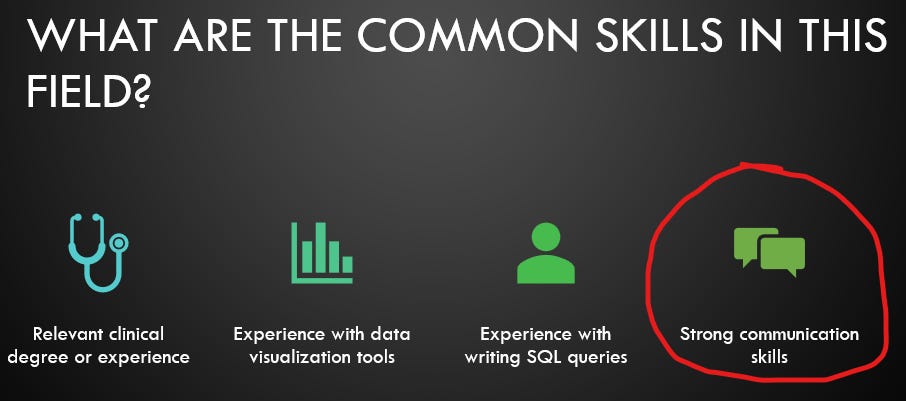When recapping the common skills you need to have for the health informatics role, I have referenced “Strong communication skills”, but what does that really mean?
What are some specific examples of using strong communication skills within the health informatics field?
As previously stated, strong communication skills are not unique to the health informatics role but I do mention it often.

Working in this field, you will often be communicating with people with a variety of backgrounds, from those who “speak” tech to those who have a clinical background and being able to tailor your message to different interested parties is key.
I recently read an interesting book titled Phantom Plague: How Tuberculosis Shaped History by Vidya Krishnan. In the book, the author traces the history of tuberculosis from the slums of 19th-century New York to modern Mumbai.
In this book, the author tells the story of Dr. Semmelweis, a doctor who specialized in obstetrics. Dr. Semmelweis ran two clinics, one for doctors who were trained on autopsies and a second clinic for midwives who did not conduct autopsies. Even though this was back in 1841, Dr. Semmelweis had a data-driven approach and noticed the differences in deaths from child bed fever, which was as high as 10% for the clinics run by doctors, whereas the second clinic, run by midwives, had an average mortality rate of less than 4%.
After years of conducting experiments, Dr. Semmelweis understood the difference between these clinics was most likely because the midwives had no contact with cadavers. Whereas the doctors in the first clinic would deal with cadavers in the morning and then, without washing their hands, would go to the maternity ward to deliver babies. From his observation, he then implemented a sterilization technique, without any prior knowledge about how germs work, and with the new handwashing routine, the death rate in the first clinic began to drop from 18% in April, to 2% in June, to finally, in August, 0 deaths were reported. You would think that with this life-saving procedure, everyone would adopt this methodology, and Dr. Semmelweis would go down in history and be loved by all.
Unfortunately this was not the case….
Dr. Semmelweis’s critical message was ignored and he died penniless in a mental institution.
He hoped that his sterilization procedure would be adopted as it was clear that his hypothesis was correct and he was saving lives. However, he was disliked by many because of his disciplinary attitude, and he did not publish any of his findings or speak to the public, to gain recognition for his discovery.
This is a lesson we can learn time and time again, regardless of how right we are, how we communicate our ideas makes all the difference! This is especially true in the healthcare field, where it can be difficult to separate our emotions from fact.
Unfortunately, sometimes the loudest voices are the ones that can rise to the top and they might not necessarily be accurate and can have adverse effects on our health. For example, this published paper in Nature, a study which is now disproved, presented the idea that a malaria drug could treat COVID-19 has been retracted — more than four-and-a-half years after it was published.
When it comes down to it, my biggest tip for communicating in this field is having a clear understanding of what the interests of your key stakeholders are. Not just having blinders to your own message and what you want to communicate but also have a good understanding of what motivates your audience.
These are examples of a few questions I have asked stakeholders when building a clinical dashboard, to get a better sense of how this product will impact them.
Questions to ask end-users:
- How will this report/dashboard help you to do your job more effectively?
- What are the top 3 benefits you want to see, as a result of this report/dashboard being implemented?
- How involved do you want to be on a daily basis when it comes to interacting with the report/dashboard?
- What processes do you already have in place to record your key performance indicators?
- What are the biggest pain points you have currently when collecting key performance indicators?
I hope I have conveyed to you the importance of communication skills in this field! What are you doing to improve your communication skills while in your current role?
0 Comments